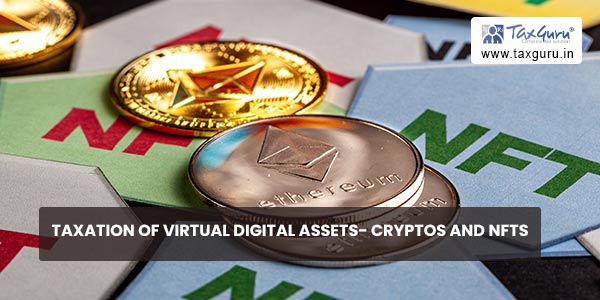Budget 2022 was an interesting Budget. There were different expectations from various stakeholders of the Indian Economy.
While Salaried individuals expect an increase in the threshold limit of deductions available under Section 80C, 24(b), HRA and the like, business class expect operational reforms in the areas pertaining to indirect taxes. While MSMEs expect increased support and collaboration schemes from the Government, the start-up community expect capital, seed funding and intellectual property assistance, to name a few.
One of the highlights of Budget 2022 was the provisions pertaining to taxation of Virtual Digital Asset, in other words, cryptos and NFTs.
Cryptocurrency (hereinafter referred to as ‘crypto’) has been one of the investment options for millennials of late. Crypto has attracted a lot of risk aggressive investors and traders, who seek to increase their profits or capital appreciation making use of the volatility prevalent in the crypto market. However, such platforms can also provide an opportunity for generation of dirty money, money laundering, funding illegal and terrorist activities and can also cause the “country’s available capital” to evaporate if the volatility is unfavourable.
Till date, there was no clarity on the legality of the cryptos and NFTs in India. While the Honourable Finance Minister said that the RBI would work on a digital Indian currency, per se, there was no direct announcement about the legality of the cryptos and NFTs in her budget speech. However, by mentioning the provisions of taxation on such cryptos and NFTs, they are considered as “virtual digital assets” under the provisions of Income Tax Act, 1961.
This provides an understanding that cryptos are not considered as “currencies” but are considered as “assets”. Likewise, NFTs are also considered as “assets”. It is interesting to note that such assets are termed as ‘Virtual Digital Assets’ under the provisions of Income Tax Act. Let us now look into the provisions of Income Tax Act pertaining to virtual digital assets.
Page Contents
Virtual Digital Asset
“Virtual digital asset” means:
1. any information or code or number or token (not being Indian currency or foreign currency), generated through cryptographic means or otherwise, by whatever name called, providing a digital representation of value exchanged with or without consideration, with the promise or representation of having inherent value, or functions as a store of value or a unit of account including its use in any financial transaction or investment, but not limited to investment scheme; and can be transferred, stored or traded electronically
2. a non-fungible token or any other token of similar nature, by whatever name called
3. any other digital asset, as the Central Government may, by notification in the Official Gazette specify
Provided that the Central Government may, by notification in the Official Gazette, exclude any digital asset from the definition of virtual digital asset subject to such conditions as may be specified therein.
Analysis of the above definition
1. Virtual Digital Asset can be either an information or a code or a number or a token,
2. Such information or a code or a number or a token should be generated through cryptographic means or otherwise,
3. Such Virtual Digital Assets provides a digital representation of a value (in numbers),
4. Buyers, Investors or Traders of such Virtual Digital Asset can exchange such digital assets for a value,
5. Such exchange can either be for a consideration or otherwise,
6. Further the definition clarifies such Indian currency or foreign currency (US Dollar, Euro, GBP, Yen, Dirham, etc) are not considered as Virtual Digital Assets.
7. Such Virtual Digital Assets can be either stored or transferred or traded electronically in various platforms. The word ‘transfer’ is broad enough to cover sale, disposal, relinquishment, exchange and release.
8. The value of such digital asset is used by the assessee in either this trade or in investment.
Taxation of Virtual Digital Asset
Finance Bill 2022 proposes a special scheme of taxation for virtual digital assets. A new Section 115BBH is proposed to be inserted for the taxation of virtual digital assets.
Section 115BBH
- Where the total income of an assessee includes any income from the transfer of any virtual digital asset, the income-tax payable shall be the aggregate of:
1. the amount of income-tax calculated on the income from transfer of such virtual digital asset at the rate of 30%.; and
2. the amount of income-tax with which the assessee would have been chargeable, had the total income of the assessee been reduced by the income referred to in clause (a)
- Notwithstanding anything contained in any other provision of this Act
1. no deduction in respect of any expenditure (other than cost of acquisition) or allowance or set off of any loss shall be allowed to the assessee under any provision of this Act in computing the income referred to in clause (a) of sub-section (1); and
2. no set off of loss from transfer of the virtual digital asset computed under clause (a) of sub-section (1) shall be allowed against income computed under any other provision of this Act to the assessee and such loss shall not be allowed to be carried forward to succeeding assessment years.
Gift of Virtual Digital Asset
Section 56(2)(x) of the Income Tax Act outlines provisions pertaining to gift of money, movable and immovable properties for inadequate or no consideration.
An Explanation to the Section 56(2)(x) is proposed to be amended which clarifies that property includes virtual digital assets.
Analysis of taxation on Virtual Digital Assets:
1. The Finance Bill 2022, taxes the income from transfer on virtual digital assets at a flat rate of 30% in the hands of the transferor. Cess on the basic tax would prevail.
2. Gift of virtual assets are also taxed in the hands of the receiver as per the provisions of Section 56(2)(x) of the Income Tax Act.
3. Further, no deduction or allowance of any expenditure incurred with respect to the transfer of such virtual digital asset is allowed as a deduction from the income.
4. This is an important clause since it address the issues of taxation of Virtual Digital Assets irrespective of the Head of Income under which it is proposed to be offered by the assessee.
5. Cost of acquisition is allowed as a deduction from the income from such transfer of VDA.
6. Further, where an assessee has income from multiple sources or heads, loss from any other source or head of income shall not be allowed to be set off with the income from the transfer of virtual digital asset.
7. Further, if an assessee has incurred loss on transfer of VDA, then the assessee shall not be eligible to set off such loss with income from any other source or head under the provisions of Income Tax Act.
8. Such loss from transfer of VDA will not be eligible to be carried forward to subsequent assessment years.
9. Let us look at the two questions which may arise to the readers

FAQS on Virtual Digital Asset
Q1 Does Taxing a Virtual Digital Asset make it legal?
A The simple answer to this is question is “NO.” Taxing virtual digital assets do not render them to be legal. Under the Income Tax Act, 1961 tax is levied even on illegal incomes and undisclosed incomes.
Q2 The Hon’ble FM mentioned about the digital currency which is the RBI is considering to be issued. Would that be a Virtual Digital Asset?
A Currencies are excluded from the definition of Virtual Digital Assets. Where the RBI considers such digital currency as a “currency” under the FEMA Act, 1999, then such digital currency would be considered as a currency as not as a Virtual Digital Asset.
It is interesting to see the stages of development which happen pertaining in our country pertaining to the virtual digital assets.






Well written article. Keep writing.